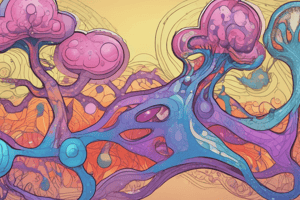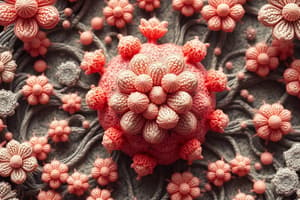Podcast
Questions and Answers
What are the reversible changes that can occur in cells?
What are the reversible changes that can occur in cells?
Hypertrophy, hyperplasia, atrophy, metaplasia, and dysplasia
What is an example of a physiologic hypertrophy?
What is an example of a physiologic hypertrophy?
Uterine enlargement during pregnancy
What can pathologic hyperplasia progress to?
What can pathologic hyperplasia progress to?
Dysplasia and cancer
What causes atrophy in cells?
What causes atrophy in cells?
What leads to metaplasia in cells?
What leads to metaplasia in cells?
What is the term used to describe the formation of bone within muscle after trauma?
What is the term used to describe the formation of bone within muscle after trauma?
What term is used to describe disordered, precancerous epithelial cell growth?
What term is used to describe disordered, precancerous epithelial cell growth?
Which type of dysplasia may regress with alleviation of the inciting cause?
Which type of dysplasia may regress with alleviation of the inciting cause?
What is the term for the change in cell structure involving an increase in cell size and/or number?
What is the term for the change in cell structure involving an increase in cell size and/or number?
Which type of change in cell type and structure is considered irreversible and progresses to carcinoma in situ?
Which type of change in cell type and structure is considered irreversible and progresses to carcinoma in situ?
Flashcards are hidden until you start studying
Study Notes
Cellular Adaptations
- Cellular adaptations can be reversible and can be either physiologic or pathologic in nature.
- Physiologic examples include uterine enlargement during pregnancy, while pathologic examples include myocardial hypertrophy due to systemic hypertension.
Hypertrophy
- Hypertrophy is an increase in the size of cells due to an increase in structural proteins and organelles.
- Example: cardiac hypertrophy, which can lead to myocardial injury and heart failure if the stress is excessive or persistent.
Hyperplasia
- Hyperplasia is an increase in the number of cells due to controlled proliferation of stem cells and differentiated cells.
- Example: benign prostatic hyperplasia.
- Excessive stimulation can lead to pathologic hyperplasia, which may progress to dysplasia and cancer.
Atrophy
- Atrophy is a decrease in tissue mass due to a decrease in the size of cells (via cytoskeleton degradation and autophagy) and/or the number of cells (via apoptosis).
- Causes of atrophy include disuse, denervation, loss of blood supply, loss of hormonal stimulation, and poor nutrition.
Metaplasia
- Metaplasia is the reprogramming of stem cells to replace one cell type with another that can adapt to a new stress.
- Examples: Barrett esophagus (replacement of squamous epithelium with columnar epithelium in response to gastric acid), and respiratory ciliated columnar epithelium replaced by stratified squamous epithelium in response to tobacco smoke.
- Metaplasia can progress to dysplasia and malignant transformation if the insult persists.
Dysplasia
- Dysplasia is a disordered, precancerous epithelial cell growth characterized by loss of uniformity of cell size and shape (pleomorphism), loss of tissue orientation, and nuclear changes.
- Mild and moderate dysplasias may regress with alleviation of the inciting cause, but severe dysplasia often becomes irreversible and progresses to carcinoma in situ.
- Dysplasia is often preceded by persistent metaplasia or pathologic hyperplasia.
Studying That Suits You
Use AI to generate personalized quizzes and flashcards to suit your learning preferences.




